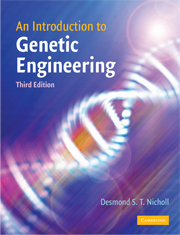
-
This book is unavailable for purchase
-
Select format
-
- Publisher:
- Cambridge University Press
- Publication date:
- 05 June 2012
- 29 May 2008
- ISBN:
- 9780511800986
- 9780521615211
- Dimensions:
- Weight & Pages:
- Dimensions:
- (253 x 177 mm)
- Weight & Pages:
- 0.77kg, 347 Pages
- Subjects:
- Genetics, Life Sciences, Biotechnology
You may already have access via personal or institutional login- Subjects:
- Genetics, Life Sciences, Biotechnology
Book description
In this third edition of his popular undergraduate-level textbook, Des Nicholl recognises that a sound grasp of basic principles is vital in any introduction to genetic engineering. Therefore, the book retains its focus on the fundamental principles used in gene manipulation. It is divided into three sections: Part I provides an introduction to the relevant basic molecular biology; Part II, the methods used to manipulate genes; and Part III, applications of the technology. There is a new chapter devoted to the emerging importance of bioinformatics as a distinct discipline. Other additional features include text boxes, which highlight important aspects of topics discussed, and chapter summaries, which include aims and learning outcomes. These, along with key word listings, concept maps and a glossary, will enable students to tailor their study to suit their own learning styles and ultimately gain a firm grasp of a subject that students traditionally find difficult.
Reviews
‘An easy to follow narrative, accompanied by simple, clear diagrams, provides the interested student with the background needed … the book, therefore, fills an important niche and should be brought to the attention of upper-level undergraduate students and beginning graduate students in any branch of biology that makes use of molecular techniques.’
Source: ASM News
‘… easy to read, clear and well organised … I certainly recommend it for all sixth-form libraries. In addition, this is an accessible but comprehensive basic text for the undergraduate to use.’
Pauline Lowrie Source: Biology
'I know my days of being lost and struggling to find my way in genetic engineering lectures would not have happened if I had come across this textbook much earlier.'
Source: Journal of Biological Education
Contents
Metrics
Altmetric attention score
Full text views
Full text views help Loading metrics...
Loading metrics...
* Views captured on Cambridge Core between #date#. This data will be updated every 24 hours.
Usage data cannot currently be displayed.
Accessibility standard: Unknown
Why this information is here
This section outlines the accessibility features of this content - including support for screen readers, full keyboard navigation and high-contrast display options. This may not be relevant for you.
Accessibility Information
Accessibility compliance for the PDF of this book is currently unknown and may be updated in the future.


